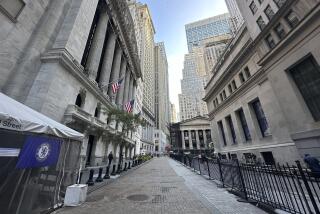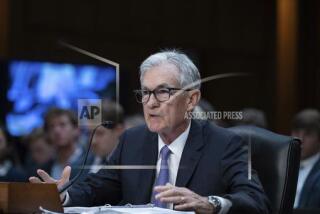Fed Unlikely to Raise Rates Right Now, Greenspan Says
WASHINGTON — Federal Reserve Board Chairman Alan Greenspan signaled Tuesday that the Fed is unlikely to raise interest rates any time soon but indicated policymakers will act quickly if inflation pressures resume and warned that early signs of rising wage levels could mean higher inflation down the road.
In his wide-ranging testimony before the Senate Budget Committee, Greenspan said the performance of the American economy “has continued to surpass most forecasters’ expectations,” with “few signs of imbalances and inflationary tension” to cloud the outlook for the next few months.
At the same time, however, the Fed chairman said that given the lag between the time the central bank changes course and the actual impact of its actions on the economy, senior Fed policymakers would be on the lookout for new price pressures.
Greenspan’s remarks appeared to bolster assessments by analysts that, while the central bank is unlikely to raise interest rates at its next policymaking meeting Feb. 4 and 5, it is prepared to move swiftly when it sees firm signs that inflation is growing.
“He was clearly preparing the markets for a tightening move, but he showed no apparent urgency about when that might take place,” said David M. Jones, chief economist for Aubrey G. Langston & Co. in New York and a veteran Fed watcher.
Dana Johnson, managing director of First Chicago Capital Markets, agreed.
“It was a predictably ambiguous message,” he said, “designed to keep the market on notice that the Fed is being vigilant.”
Both analysts predicted modest interest-rate hikes in late spring.
Greenspan, looking hard for evidence of renewed inflation, warned that there are early signs that the willingness of American workers to accept modest wage increases--a major reason for the current low inflation--may be coming to an end.
“The question is, of course, ‘Where do we go from here?’ ” Greenspan asked rhetorically on Tuesday. “Because monetary policy works with a lag, it is not the conditions prevailing today that are critical but, rather, those likely to prevail in six to 12 months.”
Senior officials of the Federal Reserve Board have hinted in speeches over the last week that, although the economy is now at a point where inflation could easily accelerate again, they do not intend to boost interest rates until they see clear signs that it is on the rise.
The nation’s stock markets, for example, fell sharply last summer immediately after strong economic statistics convinced some investors that the Fed would have to tighten its money and credit policies. In the end, however, the central bank left interest rates unchanged and stock prices rebounded.
On Tuesday, the markets seemed to take Greenspan’s comments in stride. After shedding 44 points immediately following his remarks, the Dow Jones industrial average regained strength and closed at a record 6,883.90, up 40.03 points from Monday’s level.
Senior Fed officials have been signaling for several days that the central bank’s goal--to ward off a new round of inflation while keeping the economy growing--is becoming increasingly challenging.
Fed governor Laurence H. Meyer warned last week that, with the economy performing so well, “it’s like being at the top of a mountain” where “all paths are downhill.” But he added that there is “little evidence of imbalances that would jeopardize the expansion.”
Most analysts predicted that, with the economy now so finely balanced, it would probably take only a small rise in interest rates to dampen new inflationary pressures. Policymakers also want to avoid any unnecessary interest-rate hikes that might whipsaw the markets.
Greenspan’s remarks came during testimony in which he also agreed with an independent panel of economists that today’s government statistics overstate the national inflation rate. As a consequence, he said, Americans’ incomes have more than kept pace with inflation.
He also joined Treasury Secretary Robert E. Rubin in opposing calls by conservatives for a balanced budget amendment to the U.S. Constitution, warning that it would unnecessarily hamstring economic policymakers and would be difficult to enforce.
In response to questions from lawmakers, Greenspan defended the economy’s current growth rate--which, he said, he expects will turn out to be 3% for all of 1996--as “appreciable indeed,” given the fact that the U.S. unemployment rate is at a low 5.3%.
“It was enough to generate more than 2 1/2 million new . . . jobs last year,” he told senators.
More to Read
Get the L.A. Times Politics newsletter
Deeply reported insights into legislation, politics and policy from Sacramento, Washington and beyond. In your inbox three times per week.
You may occasionally receive promotional content from the Los Angeles Times.










